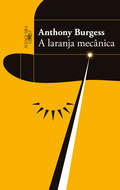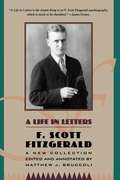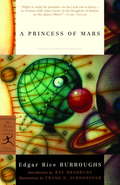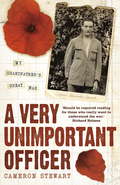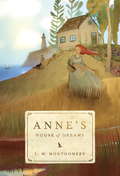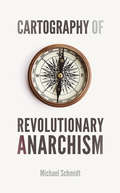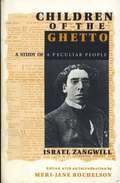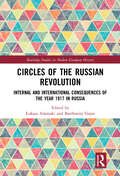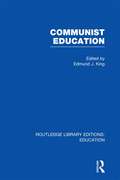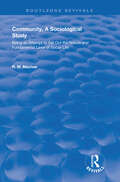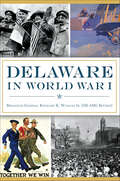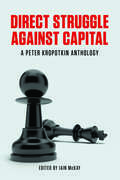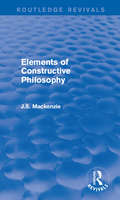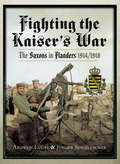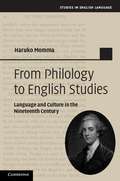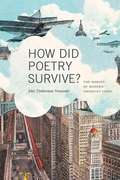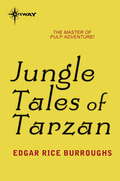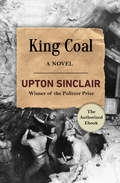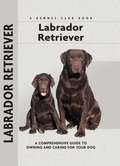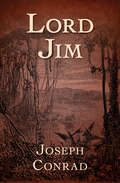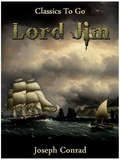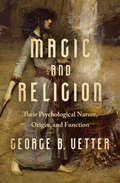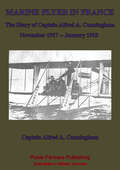- Table View
- List View
A Laranja Mecânica
by Anthony BurgessEdição comemorativa do 50.º aniversário da publicação originalUma leitura obrigatória para todas as geraçõesA Laranja Mecânica é a assustadora confissão autobiográfica de Alex, um jovem delinquente que relata os seus excessos criminosos na companhia dos amigos, Pete, Georgie e Lerdo, e que mais tarde nos dá conta da sua «reeducação». O livro pode ser lido como uma comédia grotesca ou, a um nível mais profundo, como uma fábula sobre o bem e o mal e a importância do livre-arbítrio. Tal como o genial Alex diria: «É uma história horrorochosa, que vos levará a esmecar que nem uns bezumos ou vos deixará de lágrimas nos glazos.».Comentários:«Um romance brilhante... Uma sátira alucinante sobre os desvios mentais dos indivíduos e das comunidades».The New York Times«Um livro tão assutador como maravilhoso».Roald Dahl
A Life in Letters
by F. Scott FitzgeraldA vibrant self-portrait of an artist whose work was his life. In this new collection of F. Scott Fitzgerald's letters, edited by leading Fitzgerald scholar and biographer Matthew J. Bruccoli, we see through his own words the artistic and emotional maturation of one of America's most enduring and elegant authors. A Life in Letters is the most comprehensive volume of Fitzgerald's letters -- many of them appearing in print for the first time. The fullness of the selection and the chronological arrangement make this collection the closest thing to an autobiography that Fitzgerald ever wrote. While many readers are familiar with Fitzgerald's legendary "jazz age" social life and his friendships with Ernest Hemingway, Gertrude Stein, Edmund Wilson, and other famous authors, few are aware of his writings about his life and his views on writing. Letters to his editor Maxwell Perkins illustrate the development of Fitzgerald's literary sensibility; those to his friend and competitor Ernest Hemingway reveal their difficult relationship. The most poignant letters here were written to his wife, Zelda, from the time of their courtship in Montgomery, Alabama, during World War I to her extended convalescence in a sanatorium near Asheville, North Carolina. Fitzgerald is by turns affectionate and proud in his letters to his daughter, Scottie, at college in the East while he was struggling in Hollywood. For readers who think primarily of Fitzgerald as a hard-drinking playboy for whom writing was effortless, these letters show his serious, painstaking concerns with creating realistic, durable art.
A Princess of Mars
by Edgar Rice Burroughs Ray Bradbury Frank E. SchoonoverVirginia gentleman John Carter, unexpectedly transported to the perilous red planet, Mars, finds himself captured by the loveless Green Men of Thark. As Carter struggles to win his freedom -and the affections of fellow captive Dejah Thoris, princess of the rival clan of Helium -the fate of the entire planet hangs in the balance: warring Martian tribes collide and the beleaguered Atmosphere Factory grinds to a suffocating halt. Ray Bradbury, reminiscing on the enduring thrill of Burroughs's Martian adventure, writes, "I stood on the lawns of summer, raised my hands, and cried for Mars, like John Carter, to take me home. I flew to the Red Planet and never returned."
A Very Unimportant Officer
by Alexander Stewart Captain Alexander Stewart Cameron StewartRediscovered after 80 years gathering dust on a family bookshelf and first brought to public attention on BBC Radio 4’s Today Programme, A VERY UNIMPORTANT OFFICER is a detailed and intimate account of the experience of Captain Stewart, an ordinary officer in the front line in France and Flanders throughout 1916 and 1917.Recruited to The Cameronians (Scottish Rifles) in 1915 at the age of 33, Captain Stewart went 'over the top' many times, outliving 'so many better men', as he says with typical humility.Through his vivid testimony we learn of the mud ('more like thick slime'), the flies and the difficulties of suffering dysentry while on horseback. In one memorable passage he describes engaging the enemy while smoking a pipe - an episode for which he was awarded the Military Cross.Yet through the chaos and horror of the trenches, Captain Stewart reflects with compassion on the fears and immense courage of the men under his command.Newly edited by his grandson, Cameron Stewart, A VERY UNIMPORTANT OFFICER gives us a fascinating insight into the horrors and absurdities of trench life.
A Very Unimportant Officer: Life And Death On The Somme And At Passchendaele
by Alexander StewartRediscovered after 80 years gathering dust on a family bookshelf and first brought to public attention on BBC Radio 4?s Today Programme, A VERY UNIMPORTANT OFFICER is a detailed and intimate account of the experience of Captain Stewart, an ordinary officer in the front line in France and Flanders throughout 1916 and 1917.Recruited to The Cameronians (Scottish Rifles) in 1915 at the age of 33, Captain Stewart went 'over the top' many times, outliving 'so many better men', as he says with typical humility.Through his vivid testimony we learn of the mud ('more like thick slime'), the flies and the difficulties of suffering dysentry while on horseback. In one memorable passage he describes engaging the enemy while smoking a pipe - an episode for which he was awarded the Military Cross.Yet through the chaos and horror of the trenches, Captain Stewart reflects with compassion on the fears and immense courage of the men under his command.Newly edited by his grandson, Cameron Stewart, A VERY UNIMPORTANT OFFICER gives us a fascinating insight into the horrors and absurdities of trench life.
Anne's House of Dreams
by L. M. MontgomeryGilbert Blythe is finally a doctor, and at long last he and Anne are ready to say their vows. Soon husband and wife will be bound for a new life together in their own house of dreams, on the shores of Four Winds Harbor, near Gilbert's new medical practice in the village of Glen St. Mary. Of course, a new life brings fresh surprises and fresh problems to solve. Anne and Gilbert soon find themselves entangled in the lives of their neighbors, including the lighthouse attendant, Captain Jim, with his sad stories of the sea; Miss Cornelia Bryant, a formidable woman who always speaks her mind; Owen Ford, who longs to write the Great Canadian Novel; and the tragically beautiful Leslie Moore, to whom Anne grows closer when her own perfect life is touched by heartbreak.
Cartography of Revolutionary Anarchism
by Michael SchmidtA concise history of the significance and global reach of mass organized anarchism, tracing its syndicalist origins to Mexico in 1869, then Spain, spreading to Egypt and Uruguay by 1872, then to Cuba and the United States by 1883, its dramatic rise to labor dominance throughout Latin America, and its radicalizing minority influence in Asia, Eastern Europe, the Middle East, Oceania and Sub-Saharan Africa. Historian Michael Schmidt identifies five "waves" of labor militancy that define anarchist organizing over the past 150 years, explaining the central features of each. He also explores the industrial and social foundations of anarchism/syndicalism, and during each of the "waves," interrogates key documents debating the vital relationship between the militant minority and the working and poor masses."Part history, part manifesto, Cartography of Revolutionary Anarchism is a succinct and insightful polemic. Michael Schmidt has distilled a vast literature on anarchism to demonstrate that anarchism is a historical movement with deep roots in the working class and continuity into the present. The book is lively, with equal measures of pragmatic judgement and hope; it is plainspoken, powerful, and thoughtful. Activists and scholars interested in anarchism will find here much to contemplate and debate and take to heart."--Mark Leier, author of Bakunin: A Biography
Children of the Ghetto: A Study of a Peculiar People
by Israel Zangwill Meri-Jane RochelsonIn its first appearance in 1892, Israel Zangwill's Children of the Ghetto created a sensation in both England and America, becoming the first Anglo-Jewish bestseller and establishing Zangwill as the literary voice of Anglo-Jewry. A novel set in late nineteenth-century London, Children of the Ghetto gave an inside look into an immigrant community that was almost as mysterious to the more established middle-class Jews of Britain as to the non-Jewish population, providing a compelling analysis of a generation caught between the ghetto and modern British life. This volume brings back to print the 1895 edition of Children of the Ghetto, the latest American version known to have been corrected by the author. Meri-Jane Rochelson places the novel in proper context by providing a biographical, historical, and critical introduction; a bibliography of primary and secondary sources; and notes on the text, making this ground-breaking novel accessible to a new generation of readers, both Jewish and non-Jewish alike.
Circles of the Russian Revolution: Internal and International Consequences of the Year 1917 in Russia (Routledge Studies in Modern European History)
by Bart 322 Omiej Gajos 321 Ukasz AdamskiThis volume provides the English-speaking reader with little-known perspectives of Central and Eastern European historians on the topic of the Russian Revolution. Whereas research into the Soviet Union’s history has flourished at Western universities, the contribution of Central and Eastern European historians, during the Cold War working in conditions of imposed censorship, to this field of academic research has often been seriously circumscribed. Bringing together perspectives from across Central and Eastern Europe alongside contributions from established scholars from the West, this significant volume casts the year 1917 in a new critical light.
Communist Education (Routledge Library Editions: Education)
by Len Barton Martin LawnDevelopments and trends in Communist education are traced in this authoritative survey by specialists. Eight chapters deal with particular aspects: ideology, psychology, the selective process, the roles of teachers and parents, polytechnical education, the universities and professional institutes. Three chapters survey the former East Germany, Poland and China as special case-studies. A concluding chapter examines common ground between Communist and other systems.
Community, A Sociological Study: Being an Attempt to Set Out the Nature and Fundamental Laws of Social Life (Routledge Revivals)
by Robert M. MacIverFirst published in 1917, this work seeks to be an introduction to the concept of community, the term which best expresses the object which social science as such endeavours to study; it is in community, the common life, that the interests represented by the specific social sciences are bound together, made integral, and thus amenable to a more comprehensive science. Community, A Sociological Study, includes an examination on the false perspectives of community, the elements of community, the structure of community and institutions.
Delaware in World War I (Military)
by Brigadier R.Delaware's experience in the Great War was that of an awakening. What had been a pastoral collection of farms and merchants was rapidly transformed into a dynamic, economically thriving society. From the immense munitions contribution of the DuPont Company to burgeoning shipbuilding on the Wilmington waterfront, the First State took a leading role in meeting the war's industrial demand. It fortified coastal defenses and thwarted U-boat attacks on its coast. Its men and women learned of valor and sacrifice as thousands of native sons fought in Europe and daughters volunteered on the homefront. Author Kennard R. Wiggins Jr. traces the history that changed the state forever.
Direct Struggle Against Capital
by Peter Kropotkin Iain MckayThis is the most extensive collection of Peter Kropotkin's writings available in English. Over half the selections have been translated for the first time or salvaged from long-out-of-print pamphlets and newspapers. Both an introduction to classic texts and a recontextualization of Kropotkin from saintly philosopher to dangerous revolutionary, Direct Struggle Against Capital includes a historical introduction, biographical sketch, glossary, bibliography, and index.Peter Kropotkin was one of anarchism's most famous thinkers. His classic works include The Conquest of Bread and Mutual Aid: A Factor of Evolution.Iain McKay has edited An Anarchist FAQ (volumes one and two) and Property Is Theft: A Pierre-Joseph Proudhon Anthology.
Elements of Constructive Philosophy (Routledge Revivals)
by J.S. MackenzieJ.S. Mackenzie surveys Western philosophy from Socrates to the New Realists in an uncomplicated and approachable style. Originally published in 1917, this text serves as a useful introduction to philosophy and well-summarises the key theories of great philosophers throughout the centuries and their bearing on early twentieth-century thought. It is ideal for students of Philosophy, both for beginners and the more advanced.
Fighting the Kaiser's War: The Saxons in Flanders, 1914/1918
by Andrew Lucas Jürgen SchmieschekPersonal accounts of the Great War experiences of British soldiers are well known and plentiful, but similar accounts from the German side of no man's land are rare. This highly original book vividly describes the wartime lives and ultimate fates of ten Saxon soldiers facing the British in Flanders, revealed through their intimate diaries and correspondence. The stories of these men, from front-line trench fighters to a brigade commander, are in turn used to illustrate the wider story of thousands more who fought and died in Flanders 'for King and Country, Kaiser and Reich' with the Royal Saxon Army. This ground-breaking work is illustrated with over 300 mostly unseen wartime photographs and other images, recording the German experience of the war in human detail and giving a rounded picture of how the Saxons lived and died in Flanders.
From Philology to English Studies
by Haruko MommaThe study of English language and literature in Britain changed dramatically between the end of the eighteenth century and the beginning of the twentieth. From Philology to English Studies explores the contribution of philology to this movement. Haruko Momma charts both the rise and fall of philology from antiquity to the late eighteenth century, and the impact of modern philology on the study of modern languages and literatures. Focusing in detail on the work of key philologists in the nineteenth century, Momma considers how they shaped European discourse and especially vernacular studies in Britain: William Jones's discovery of Sanskrit in British India gave rise to Indo-European studies; Max Müller's study of this same language helped spread the Aryan myth to the English-speaking world; the OED achieved its greatness as a post-national lexicon under the editorship of James Murray, a dialectologist originally from Scotland.
How Did Poetry Survive?: The Making of Modern American Verse
by John Timberman NewcombThis book traces the emergence of modern American poetry at the turn of the nineteenth century. With a particular focus on four "little magazines"--Poetry, The Masses, Others, and The Seven Arts--John Timberman Newcomb shows how each advanced ambitious agendas combining urban subjects, stylistic experimentation, and progressive social ideals. While subsequent literary history has favored the poets whose work made them distinct--individuals singled out usually on the basis of a novel technique--Newcomb provides a denser, richer view of the history that hundreds of poets made.
Jungle Tales of Tarzan (TARZAN)
by Edgar Rice BurroughsThe young Tarzan was unlike the great apes who were his only companions and playmates. Theirs was a simple, savage life, filled with little but killing or being killed. But Tarzan had all of a normal boy's desire to learn. He had painfully taught himself to read from books left by his dead father. Now he sought to apply this book knowledge to the world around him. He sought for such things as the source of dreams and the whereabouts of God. And he searched for the love and affection that every human being needs. But he was alone in his struggles to grow and understand. The life of the jungle had no room for abstractions.
Jungle Tales of Tarzan (Tarzan Ser. #Vol. 6)
by Edgar Rice BurroughsThe young Tarzan was unlike the great apes who were his only companions and playmates. Theirs was a simple, savage life, filled with little but killing or being killed. But Tarzan had all of a normal boy's desire to learn. He had painfully taught himself to read from books left by his dead father. Now he sought to apply this book knowledge to the world around him. He sought for such things as the source of dreams and the whereabouts of God. And he searched for the love and affection that every human being needs. But he was alone in his struggles to grow and understand. The life of the jungle had no room for abstractions.
King Coal: A Novel (Labor Movement In Fiction And Non-fiction Ser.)
by Upton SinclairA child of privilege plunges into a world of oppression, violence, and danger in this gripping indictment of the coal-mining industry from the Pulitzer Prize-winning author of The Jungle College leaves young Hal Warner feeling incomplete, with no sense of the "real" world outside its ivy-covered walls. So he leaves his life of privilege behind and signs on to work in a coal mine owned and operated by the General Fuel Company. But Hal finds out that there is nothing romantic about a miner's life when he is forced to work long hours under backbreaking conditions and treated as more expendable than his company-owned equipment. Hal befriends Mary Burke, a fiery miner's daughter and a passionate advocate for workers' rights. He gets caught up in the struggle to unionize, which brings him to the attention of his bosses and their powerful political allies. As Hal soon discovers, the powers-that-be will do anything to keep the unions out of Colorado's mines, even if it means getting blood on their hands. This ebook has been authorized by the estate of Upton Sinclair.
Labrador Retriever
by Margaret A. GilbertThe experts at Kennel Club Books present the world's largest series of breed-specific canine care books. Each critically acclaimed Comprehensive Owner's Guide covers everything from breed standards to behavior, from training to health and nutrition. With nearly 200 titles in print, this series is sure to please the fancier of even the rarest of breeds.
Lord Jim: Large Print
by Joseph ConradFrom the author of Heart of Darkness: A condemned British seaman on the run from a grievous mistake in his past may find redemption in the Far East. A young British seaman, Jim lands a major opportunity when he becomes first mate on the Panta, a ship transporting Muslim pilgrims to Mecca for the hajj. But when disaster strikes at sea, Jim and the rest of the crew abandon the ship and its passengers. While his crewmates evade trial, Jim must face the court and is punished for his dereliction of duty. Depressed and tortured by his conscience over his act of cowardice, and stripped of his navigation officer&’s certificate by the court, Jim travels east to avoid further scandal. His sea captain friend, Charles Marlow, helps him find work and settle in the remote island kingdom of Patusan, where the natives come to revere him. But as Jim slowly develops a measure of serenity and respect within himself, a looming danger may jeopardize the new life he has built. An adventurous tale of tragedy and redemption, Lord Jim is considered one of the greatest works by the author of Typhoon and The Secret Agent.
Lord Jim: Revised Edition Of Original Version (Classics To Go)
by Joseph ConradJim, a young British seaman, becomes first mate on the Patna, a ship full of pilgrims travelling to Mecca for the Hadj. When the ship starts rapidly taking on water and disaster seems imminent, Jim joins his captain and other crew members in abandoning the ship and its passengers. A few days later, they are picked up by a British ship. However, the Patna and its passengers are later also saved, and the reprehensible actions of the crew are exposed. The other participants evade the judicial court of inquiry, leaving Jim to the court alone. The court strips him of his navigation command certificate for his dereliction of duty. Jim is angry with himself, both for his moment of weakness, and for missing an opportunity to be a 'hero'. At the trial, he meets Charles Marlow, a sea captain, who in spite of his initial misgivings over what he sees as Jim's moral unsoundness, comes to befriend him, for he is "one of us". Marlow later finds Jim work as a ship chandler's clerk. Jim tries to remain incognito, but whenever the shameful conduct of the Patna incident catches up with him, he abandons his place and moves further east. At length, Marlow's friend Stein suggests placing Jim as his factor in Patusan, a remote inland settlement with a mixed Malay and Bugis population, where Jim's past can remain hidden. While living on the island he acquires the title 'Tuan' ('Lord'). Here, Jim wins the respect of the people and becomes their leader by relieving them from the predations of the bandit Sherif Ali and protecting them from the corrupt local Malay chief, Rajah Tunku Allang. Jim wins the love of Jewel, a woman of mixed race, and is "satisfied... nearly". The end comes a few years later, when the town is attacked by the marauder "Gentleman" Brown. Although Brown and his gang are driven off, Dain Waris, the son of the leader of the Bugis community, is slain. Jim returns to Doramin, the Bugis leader, and willingly takes a fatal bullet in the chest from him as retribution for the death of his son... (Excerpt from Wikipedia)
Magic and Religion: Their Psychological Nature, Origin, and Function
by George B. VetterThis essential text on the psychology of religion studies the fundamental origins of human spirituality. In Magic and Religion, psychologist George B. Vetter approaches magico-religious behavior as a universal human phenomenon. He examines the various wide-ranging theories regarding the psychology of religion before calling for a more scientifically rigorous approach to the subject. Putting forth his own provocative and enlightening thesis, Vetter argues that magic and religion are predictable behavior patterns developed in situations that are uncontrollable, yet of momentous importance to the individual or collective. First published in 1958, Magic and Religion was a significant contribution to the psychology and sociology of religion. Hailed by some as an essential text on the subject, it was denounced by others as heresy, in part because of its frank criticism of clerical celibacy and its early advocacy for abortion rights.
Marine Flyer In France — The Diary Of Captain Alfred A. Cunningham, November 1917 - January 1918
by Captain Alfred Austell CunninghamDuring November and December 1917, Captain Alfred A. Cunningham, the first Marine Corps aviator, travelling under orders from Major General Commandant George Barnett, toured the battlefronts and flying fields of France to observe Allied air operations and training.The diary, kept in tiny, neat handwriting in a small pocket notebook, begins on 3 November 1917 with Cunningham's sailing from New York on board the S. S. St. Paul. After a description of a rough winter passage through the North Atlantic U-boat zone, the entries record the confusion, inconveniences, and hardships of wartime London and Paris and contain repeated expressions of homesickness, along with sometimes acid comment on the French people and culture. His tour of British and French airfields culminated with his flying a number of the different aircraft then in service, even flying himself with French airmen on combat missions in December 1917.
